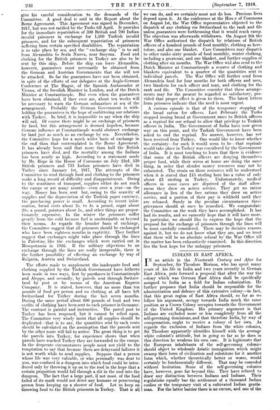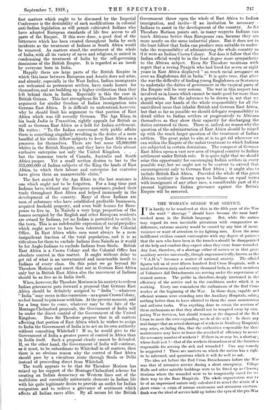INDIANS IN EAST AFRICA. I N an article in the Nineteenth
Century and Alter for September, Sir Theodore Morison, who has spent many years of his life in India and two years recently in German East Africa, puts forward a proposal that after the war the colony which was German East Africa shall be specifically assigned to India as a field for Indian colonization. He further proposes that India should be responsible for the administration and defence of this extensive colony—in fact, that this great region of East Africa should, so far as we follow his argument, occupy towards India much the same position as a Crown Colony occupies towards the Government of the United Kingdom. His primary argument is that Indians are excluded more or less completely front all the self-governing dominions, and that therefore India, by way of compensation, ought to receive a colony of her own. As regards the exclusion of Indians from the white colonies, Sir Theodore apparently identifies himself with the average white colonist's attitude, but in going so far as he does m this direction he weakens his own case. It is legitimate that the European inhabitants of the self-governing colonies should object to wholesale Asiatic immigration which might swamp their form of civilization and substitute for it another form which, whether theoretically better or worse, would certainly be fundamentally different. That may be conceded without hesitation. Some of the self-governing colonies have, however, gone far beyond this. They have refused to draw any distinction between Indians and Indians. Their regulations equally bar the settlement of a thousand Indian coolies or the temporary visit of a cultivated Indian gentle- man For the latter barrier there is no excuse, and one of the first matters which ought to be discussed by the Imperial Conference is the desirability of such modifications in colonial anti-Indian legislation as will permit cultivated Indians who have adopted European standards of life free access to all parts of the Empire. If this were done, a good deal of the bitterness which has been created throughout India by such incidents as the treatment of Indians in South Africa would be removed. As matters stand, the sentiment of the whole of India, with all its variety of races and religions, is united in condemning the treatment of India by the self-governing dominions of the British Empire. It is regarded as an insult by everyone born in India. . Happily there are large parts of the British Empire in which this issue between European and Asiatic does not arise, and already, especially in the West Indies, Indian immigrants are welcomed as permanent settlers, have made homes for themselves, and are building up a higher civilization than they left behind them in India. Especially is this the case in British Guiana. This fact strengthens Sir Theodore Morison's argument for similar freedom of Indian immigration into German East Africa. It is difficult to understand, however, why he should limit his argument to that portion of East Africa which was till recently German. The Aga Khan, in his book India in Transition, rightly appeals for British as well as German East Africa as a field for Indian settlement. He writes : " To the Indian conversant with public affairs there is something singularly revolting in the desire of a mere handful of his white fellow-subjects to keep East Africa as a preserve for themselves. There are but some 65,000,000 whites in the British Empire, and they have for their almost exclusive enterprise not only the United Kingdom. . . . but the immense tracts of Canada, Australia and South Africa proper. Yet a small section desires to bar to the 315,000,000 of Indian subjects of the King the lands of East Africa, to which their labour and enterprise for centuries have given them an unanswerable claim."
The fact stated by the Aga Khan in the last sentence is one which ought not to be forgotten. For a long time past Indians have, without any European assistance, pushed their trade throughout East Africa and helped immensely in the development of the country. Many of these Indians are men of substance who have established profitable businesses, acquired freehold property, and even built houses for Euro- peans to live in. In Nairobi a very large proportion of the houses occupied by the English and other European residents are owned by Indians, yet no Indian is permitted to settle in the town. This is an indefensible expression of racialprejudice which ought never to have been tolerated by the Colonial Office. In East Africa white men must always be a mere insignificant fraction of the total population, and it is as ridiculous for them to exclude Indians from Nairobi as it would be for Anglo-Indians to exclude Indians from Simla. British East Africa is a Crown Colony and the Colonial Office has absolute control in this matter. It ought without delay to get rid of what is an unwarranted and inexcusable insult to Indians of every class. On this point we go beyond Sir Theodore Morison and assert that not in German East Africa only but in British East Africa also the movement of Indians should be as free as in India itself.
When, however, Sir Theodore Morison in his anxiety to redress Indian grievances puts forward a proposal that German East Africa should be definitely assigned to " India "—whatever " India "may mean in this connexion—as a quasi-Crown Colony, we feel bound to join issue with him. At the present moment, and for a long time to come, whatever may be the fate of the Montagu-Chelmsford proposals, the Government of India will be under the direct control of the Government of the United Kingdom. Does Sir Theodore propose that in all matters affecting that portion of East Africa which he wishes to assign to India the Government of India is to act on its own authority without consulting Whitehall ? If so, he would give to the Government of India a greater power of control in Africa than in India itself. Such a proposal clearly cannot be defended. If, on the other hand, the Government of India will continue, as it must, to be subordinate to Whitehall in all matters, then there is no obvious reason why the control of East Africa should pass by a circuitous route through Simla or Delhi instead of proceeding direct from Whitehall. The truth appears to be that Sir Theodore Morison has mixed up his support of the Montagu-Chelmsford scheme for creating an Indian democracy on Western lines out of the multiform and essentially aristocratic elements in Indian life with his quite legitimate desire to provide an outlet for Indian emigration and to redress a grievance of sentiment which affects all Indian races alike. By all means let the British Government throw open the whole of East Africa to Indian immigration, and invite—if an invitation be necessary — Indians to assist in the development of the country. As Sir Theodore Morison points out, in many respects Indians can teach Africans better than Europeans can, because they are more nearly on the same industrial plane. But it does not in the least follow that India can produce men suitable to under- take the responsibility of administering the whole country as if it were an Indian Crown Colony. Nor does it follow that the Indian official would be in the least degree more sympathetic to the African subject. Even Sir Theodore mentions with regret that a roving Punjabi who had lived for seven or eight years in East Africa displayed " as much racial arrogance as ever an Englishman did in India." It is quite true, that after the war the difficulty of finding young Englishmen or Scotsmen to undertake the duties of government in the tropical parts of the Empire will be very serious. The war in this respect has involved us in losses which cannot be made good for more than a generation. But the inference to be drawn is, not that. we should wipe our hands of the whole responsibility for all the uncivilized races that inhabit British and German East Africa, but that as far as possible we should delegate responsibility in detail either to Indian settlers or progressively to Africans themselves as they show their capacity for discharging the duties entrusted to them. There is, indeed, no reason why the question of the administration of East Africa should be mixed up with the much larger question of the treatment of Indian settlers. The great point to aim at is to get rid wherever we can within the Empire of the unfair treatment to which Indians are subjected in certain dominions. The conquest of German East Africa opens a vast new area of tropical country to Indian settlement under British rule. It is quite right that we should seize this opportunity for encouraging Indian settlers in every possible way, but we ought not to be content to extend that encouragement only to German East Africa ; it ought also to include British East Africa. Provided the whole of this great African territory is thrown open to Indians on equal terms with immigrants of any other race, a considerable part of tl.e present legitimate Indian grievance against the Britis:t Empire will be removed.



























 Previous page
Previous page